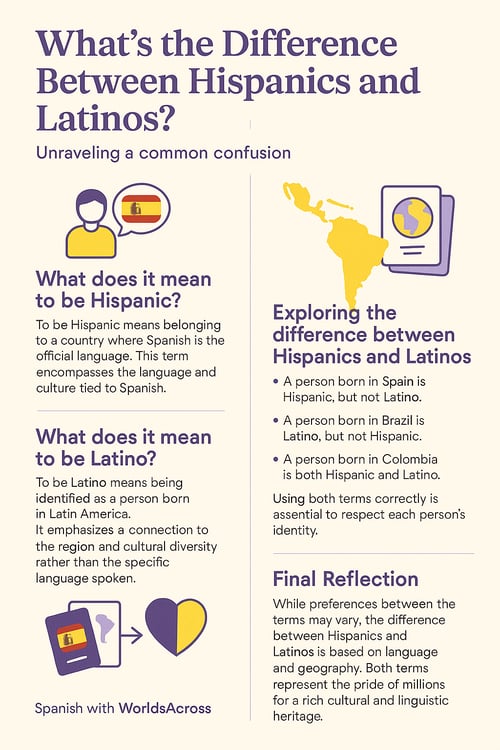What’s the Difference Between Hispanics and Latinos?

If someone asked you whether a Spaniard is Latino or Hispanic, what would you say? And how would you respond if they asked the same question about a Brazilian? If you already know the answer—congratulations! If not, don’t worry. Although these questions may seem simple, the confusion between both terms is much more common than you might think. Many people use "Hispanic" and "Latino" as if they were synonyms, when in fact they have different meanings. Let’s explore the difference between Hispanics and Latinos and clear up this common confusion together!
What Does It Mean to Be Hispanic?
Let’s start this article on Hispanics vs. Latinos by clarifying that the term Hispanic is more related to language than to place of origin. In other words, being Hispanic means being from a country where Spanish is the official language. This means that if you were born in countries like Mexico, Colombia, Argentina, Venezuela, or Spain, you can consider yourself Hispanic. It’s important to understand that the concept of Hispanic is not limited to geography—it also encompasses the language and culture connected to Spanish.
What Does It Mean to Be Latino?
On the other hand, the term Latino is not related to language, but rather to geographic location. It is used to identify people born in Latin America. A good example is Brazil: although its official language is Portuguese, Brazilians are considered Latinos because they belong to this region. In short, if you were born in any Latin American country, you can call yourself Latino. This term highlights a connection to the region and its cultural diversity more than to a specific language.
Exploring the Difference Between Hispanics and Latinos
Congratulations! Now that you understand the difference between Hispanics and Latinos, you can answer the questions posed at the beginning of the article. To better illustrate the distinction between Hispanics vs. Latinos, remember the following:
- A person born in Spain is Hispanic, but not Latino.
- A person born in Brazil is Latino, but not Hispanic.
- A person born in Colombia is both Hispanic and Latino, since they speak Spanish and are from Latin America.
Using both terms accurately is essential for respecting each person’s identity.

Perspectives and Preferences
Sometimes people do not identify as either Hispanic or Latino due to differences in language or place of origin. These perceptions can vary due to multiple personal and cultural factors. Let’s dive deeper into these aspects to better clarify these distinctions.
Cultural and Family Influence
For many, identifying as Hispanic is more than just a label; it’s a way to express a genuine and deep connection to the Spanish language and cultural heritage. Those who prefer the term Hispanic often associate it with how their families have passed down a love for the Spanish language through generations. This link to the language represents a significant source of pride for those who value their linguistic heritage.
Self-Identification and Generations
One of the most fascinating aspects of identity is how it can evolve over time and between generations. Those who immigrated to the United States from Spanish-speaking countries often prefer the term Hispanic because it represents pride in their native language and the traditions of their homeland. In contrast, later generations who grow up in a different cultural environment—where Spanish may not be dominant—might lean toward the term Latino to reflect an identity that transcends language and encompasses a broader connection to Latin America. This evolution in self-identification reflects broader cultural and social changes over time.
In conclusion, while the preference between the terms Hispanic and Latino may vary depending on personal and cultural factors, the key difference lies in language and geography. Hispanics are those from countries where Spanish is the native language, while Latinos refer to people from Latin America, regardless of what language they speak. Both terms reflect the pride of millions of people in a rich cultural and linguistic heritage.
We hope you found this explanation of Hispanics vs. Latinos helpful and that it cleared up any confusion you may have had. Remember that, at the end of the day, both terms are meaningful for what they represent—they reflect the pride of a unique cultural heritage.




